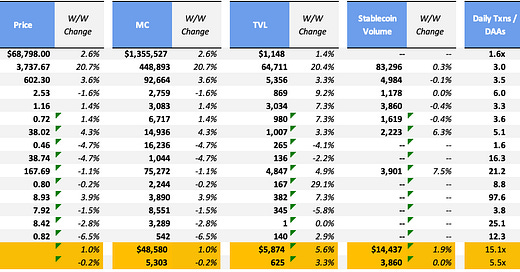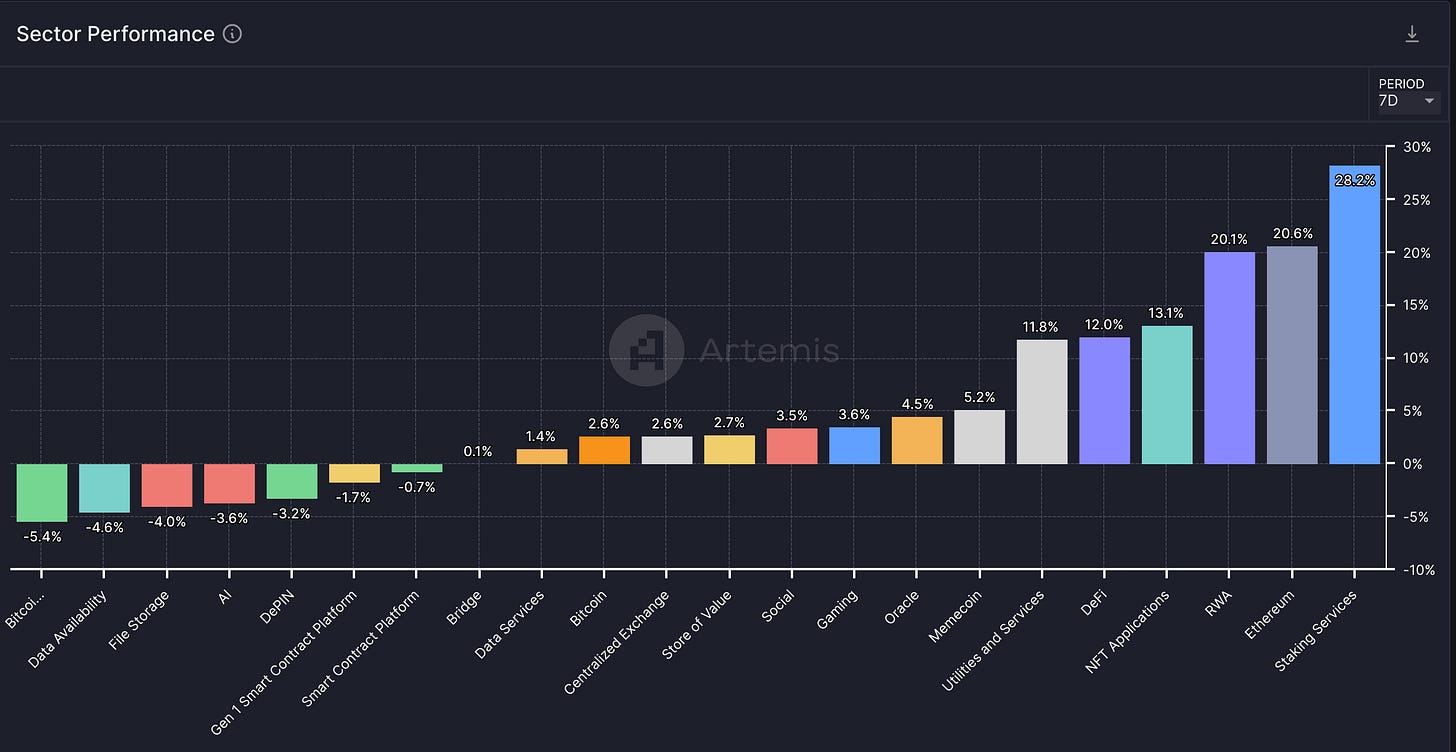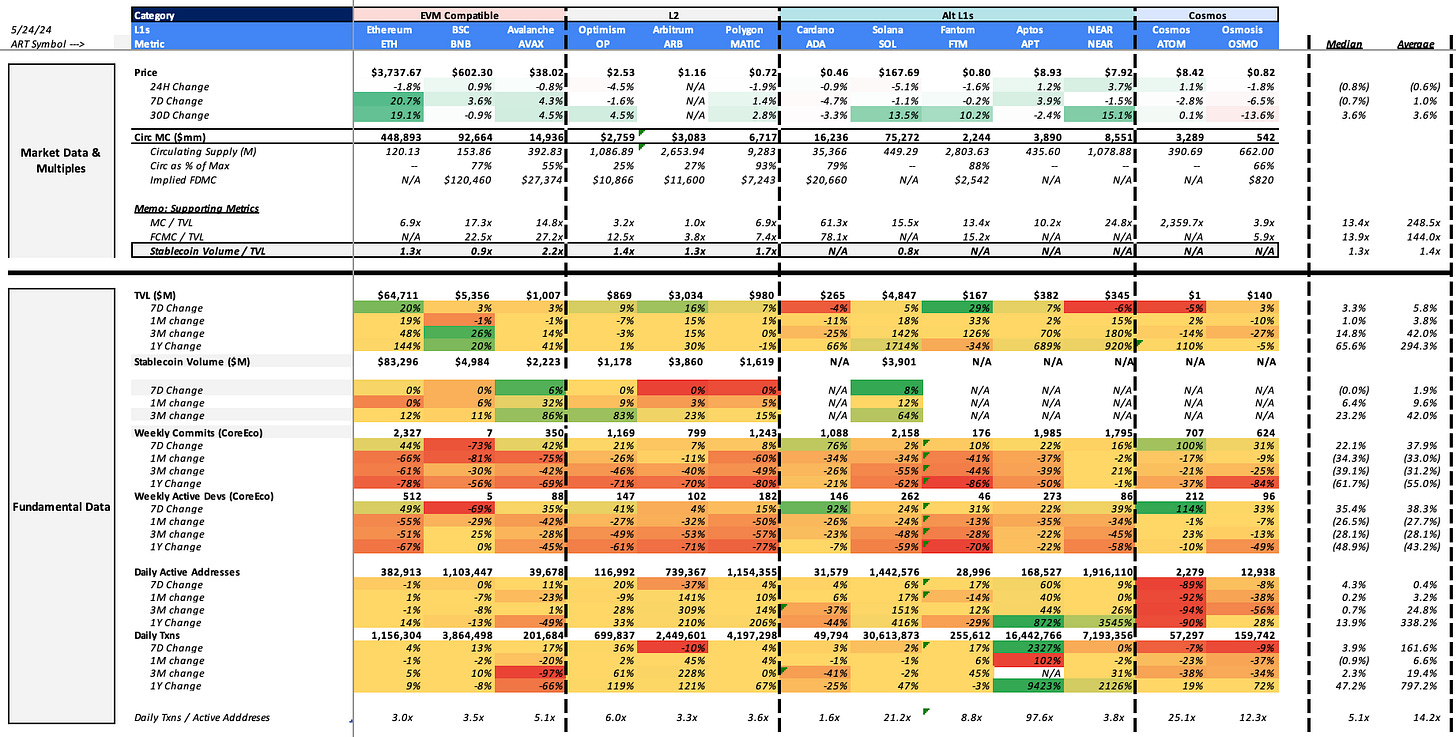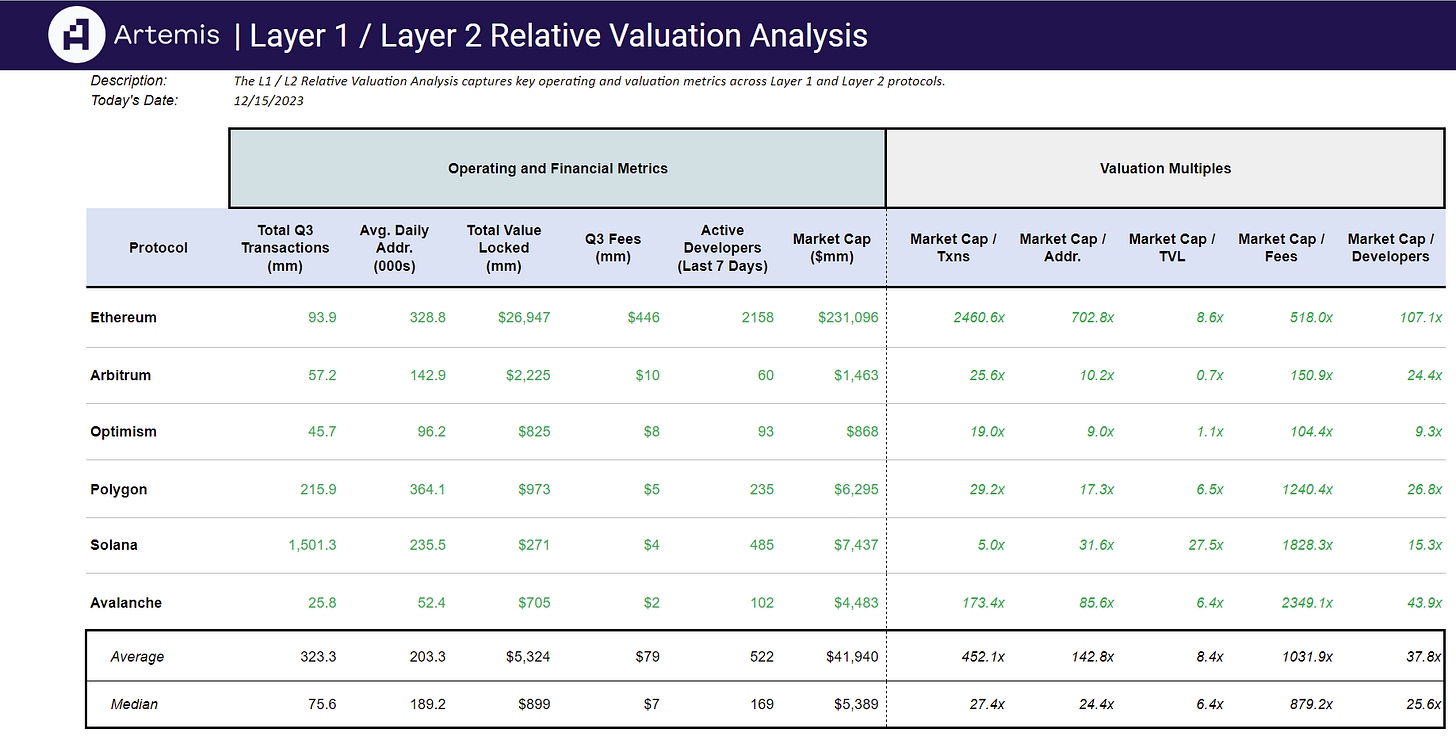This week, Farcaster raises 150m Series A led by Paradigm (The Block), Genesis settles with NYAG for $2 billion (Coindesk), Metamask to add support for Bitcoin (Coindesk) and physically backed bitcoin and ether ETPs set to launch in the UK (Blockworks).
💫 SEC 19b-4 Filings: A Pivotal Week for Crypto ETFs
🌞 FIT 21 Act: Legislative Progress and Future Implications
This week saw digital asset markets trade sideways despite a flurry of positive regulatory activity (average and median WoW change of 1.0% and -0.2%). The standout asset this week was ETH after numerous positive developments came out of DC including the passing of Ethereum spot ETFs. In our analysis of broader crypto sectors, the Staking Services sector saw a growth of approximately 28.2% week-over-week. Notably, assets like LDO and RPL outperformed ETH this week, positioning them as higher beta alternatives to ETH and highlighting their potential for greater volatility and returns vs. ETH. Meanwhile, the RWA sector (consisting of ONDO, CPOOL and MPL) grew ~20% WoW, in line with Ethereum WoW gains.
S&P Global’s Flash US PMI data this week showed that US business activity growth accelerated its fastest in over two years in May. This data signals improved economic performance in the country, and could be an indicator of continued higher-for-longer interest rates. This phenomenon could help explain why the crypto market traded sideways despite some of the best regulatory news the US crypto industry has had in recent years. In the equities markets, the Nasdaq Composite finished the week up 1.5%, largely driven by NVIDIA which posted a 13% weekly gain. On the other hand, the Dow Jones Industrial index traded down about 2.30% as investors factored in the declining probability of an upcoming rate cut.
💫 SEC 19b-4 Filings: A Pivotal Week for Crypto ETFs
This week marked a significant milestone for the cryptocurrency market in the United States, driven by the U.S. Securities and Exchange Commission (SEC) and its handling of 19b-4 filings related to Ethereum ETFs. With the May 23rd deadline for VanEck’s Ether ETF application rapidly approaching, the market braced for a potential denial or delay. The SEC's recent actions signal a shift toward a more favorable regulatory stance on cryptocurrencies.
Early in the week, the SEC urged exchanges to expedite their 19b-4 filings, crucial for listing Ethereum ETFs. By Thursday, the first approvals were granted, including the Chicago Board Options Exchange (CBOE), Nasdaq, and NYSE, allowing them to list VanEck’s spot Ether ETF and other similar products for trading. This wave of approvals marks a shift in regulatory attitude, opening doors for nine issuers such as BlackRock and ARK Investments to launch their spot Ether ETFs.
Despite this progress, the approval of S-1 filings, required before any ETFs can be officially listed, remains uncertain. Analysts speculate that the SEC's approval of 19b-4 filings was a strategic move to build goodwill within the U.S. crypto industry. Eric Balchunas of Bloomberg posits that while the approval of S-1 filings is likely, the timing remains unclear.
This development is poised to legitimize cryptocurrencies as investable assets. Approval of ETH Spot ETFs would signify that U.S. regulatory agencies consider Ethereum a commodity rather than a security, despite arguments stemming from its transition from proof-of-work to proof-of-stake. The SEC has previously argued that staking constitutes an investment contract under the Howey Test, given locking of tokens and expected staking rewards.
For reference, see below a chart of US Bitcoin ETF flows. We can see a third wave of inflows in the back-half of May following early May’s large outflows. Analysts currently anticipate that ETH ETFs would not draw the same amount of inflows as the bitcoin ETF given it is less of a household name than Bitcoin outside of the crypto industry.
🌞 FIT 21 Act: Legislative Progress and Future Implications
In another significant regulatory development, the Financial Innovation and Technology for the 21st Century Act (FIT 21) passed the House of Representatives with robust bipartisan support, signaling a monumental shift in the legislative approach towards digital assets. The bill passed with a 279-136 vote, receiving backing from 71 Democrats, a notable contrast to the 21 Democrats who voted to rescind the SEC’s SAB 121 a week ago.
In short, the bill proposes that digital assets be classified as either restricted digital assets or digital commodities. Assets classified under the former would fall under the SEC’s jurisdiction, while those in the latter group would be regulated by the CFTC. The bill additionally proposes a framework for classifying these assets based on the degree of decentralization of their associated ‘blockchain system’, who the holders of the asset are, and how the assets were distributed.
The White House, while opposing the bill in its current form, expressed willingness to collaborate with Congress to establish a balanced regulatory framework. The Administration emphasized the importance of promoting responsible digital asset development and maintaining U.S. leadership in the global financial system, despite concerns that FIT 21 currently lacks sufficient consumer and investor protections. The Office of the President stated that “the Administration is eager to work with Congress to ensure a comprehensive and balanced regulatory framework for digital assets, building on existing authorities, which will promote the responsible development of digital assets and payment innovation and help reinforce United States leadership in the global financial system.”
House Representative Dusty Johnson highlighted the significance of this legislative victory, stating it brings the U.S. closer to establishing clear regulations for the tech and finance sectors, ensuring America remains a global hub for innovation. The bill now advances to the Senate, where its prospects appear increasingly favorable. Senate Majority Leader Chuck Schumer's recent pro-crypto stance suggests a possible shift towards a more supportive regulatory environment.
For the complete text of the FIT 21 Act, refer to the official documentation. For a more digestible analysis of the bill, see Davis Polk’s recent client update.
These two stories underscore a transformative week for the cryptocurrency industry, with regulatory and legislative developments paving the way for increased institutional participation and clearer regulatory frameworks.
Liquid Token + Crypto VC Roles
See below for job postings from friends of Artemis! Feel free to reach out directly to us if you’re interested in applying / learning more about the roles!
Detailed dashboard for people who love more numbers in smaller font:
Note: Revenue represents fees that go to the protocol’s treasury or are returned to tokenholders via a burn mechanism. Weekly commits and weekly dev activity as of 5/5/24.
The content is for informational purposes. None of the content is meant to be investment advice. Use your own discretion and independent decision regarding investments.
Artemis Sheets
Check out other analyses such as the Artemis Relative Valuation L1 / L2 Analysis in Google Sheets here! Track valuation multiples across key operating metrics for top blockchain including Ethereum, Arbitrum, Optimism and Solana.
Powered by Artemis Sheets 🌞












